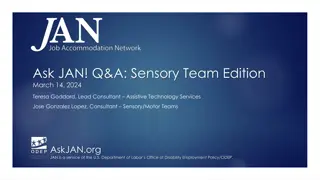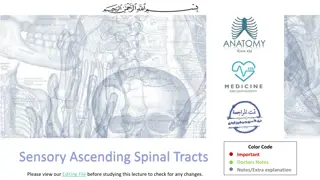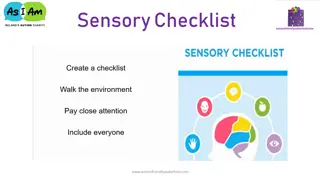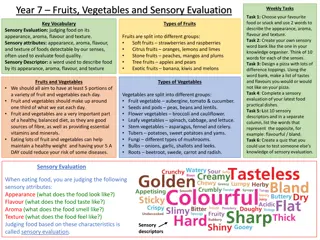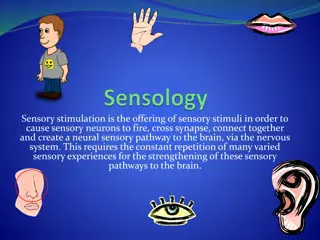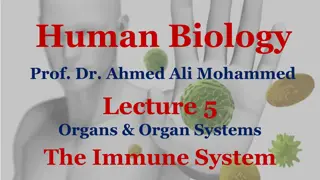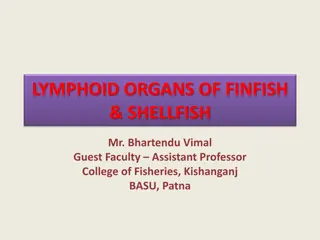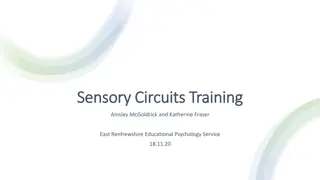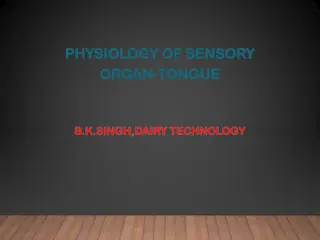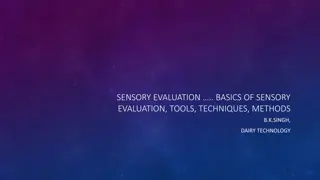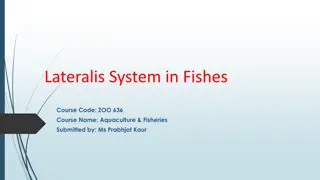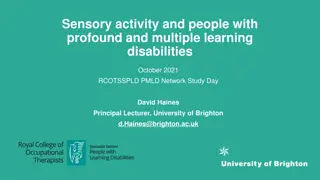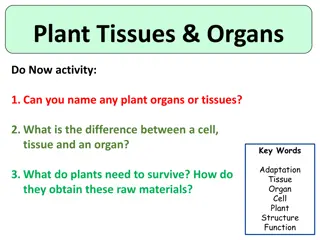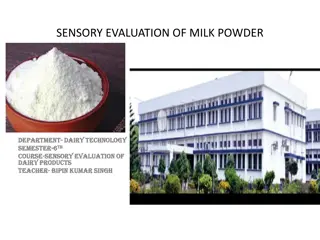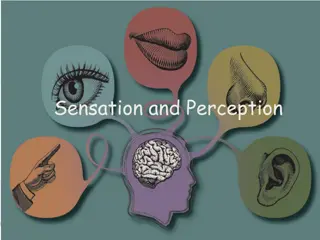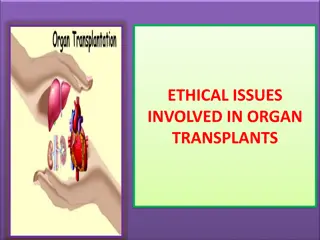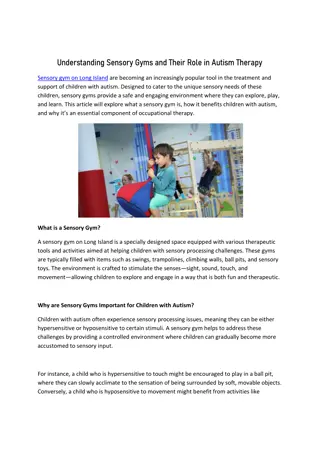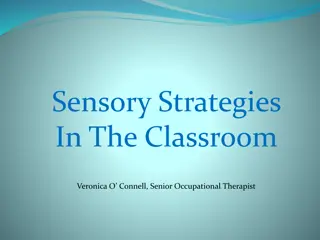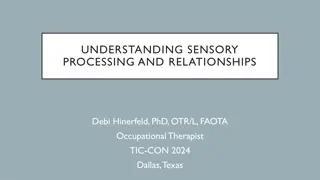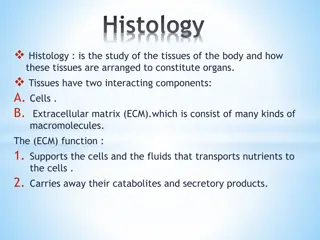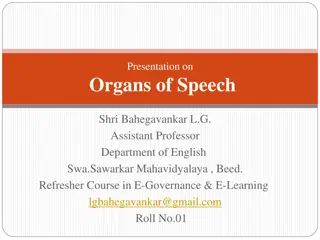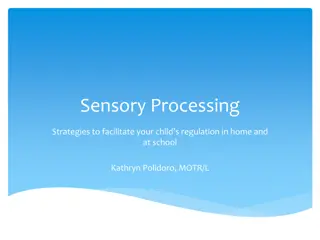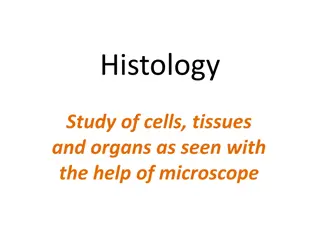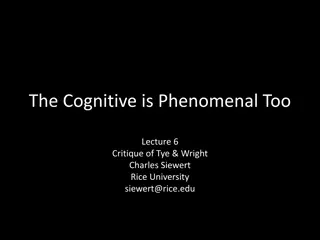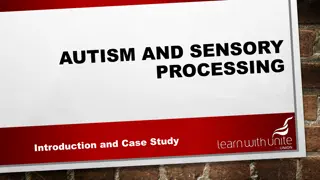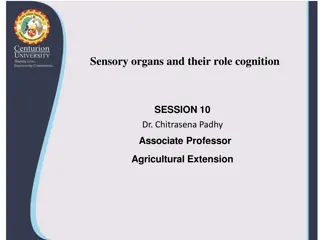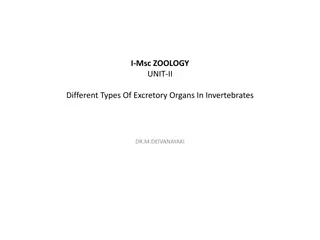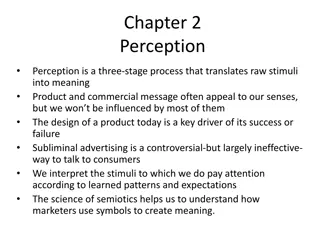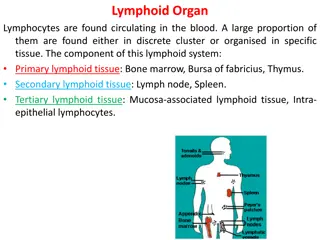Should We Allow a Market for Transplant Organs?
Analyzing the dilemma of organ shortages in the US, this content explores the ethical dimensions of creating a market for transplant organs. Through discussions on economics, ethics, and decision-making processes in allocating scarce organs, it delves into the complexities of determining who should
0 views • 22 slides
Sensory Team Q&A Session Overview
Training overview for the Ask JAN Q&A: Sensory Team Edition on March 14, 2024. Learn about accommodation topics related to sensory impairments, respiratory conditions, digital accessibility, and more. Get insights from JAN consultants and engage in interactive discussions. Discover how JAN's Sensory
2 views • 30 slides
Sensory Ascending Spinal Tracts
Learn about sensory ascending spinal tracts, their classification, functions, and pathways. Explore how information is carried to the brain at conscious and subconscious levels through different types of sensations. Gain insights into the organization of white matter tracts and their importance in s
4 views • 22 slides
Enhancing Sensory Experience for Autism-Friendly Communities
Discover sensory checklists, accommodations, maps, and sensory boxes designed to create inclusive spaces for individuals with autism on autismfriendlywaterford.com. Experience a range of resources to optimize comfort and accessibility across public and employment spaces.
0 views • 5 slides
Exploring Fruits, Vegetables, and Sensory Evaluation in Food Science
Delve into the world of fruits, vegetables, and sensory evaluation through engaging tasks like describing favorite foods, creating sensory word banks, designing unique pizzas, and conducting sensory evaluations. Learn about different types of fruits and vegetables, their importance in a balanced die
0 views • 4 slides
Sensory Stimulation for Neural Pathway Development
Sensory stimulation involves offering sensory stimuli to activate sensory neurons, cross synapses, and create neural pathways to the brain. Consistent exposure to varied sensory experiences is crucial for strengthening these pathways. The provided content includes activities such as introducing lear
0 views • 9 slides
Understanding the Immune System: Organs, Functions, and Importance
The immune system acts as a defense mechanism against pathogens and infections, comprising various organs, such as the bone marrow, thymus, spleen, white blood cells, antibodies, complement system, and the lymphatic system. It works to recognize and destroy harmful microbes, maintaining the body's h
1 views • 23 slides
Understanding Sensory Loss in Adults: Causes, Signs, and Impact
Sensory loss, including sight and hearing impairment, can affect individuals of any age. Causes range from trauma to genetic conditions, with indicators like changes in behavior or difficulty with communication. This loss can significantly impact daily life, communication, and social interactions. R
0 views • 13 slides
Overview of Lymphoid Organs in Finfish and Shellfish
Lymphoid organs play a crucial role in the defense mechanisms of finfish and shellfish by generating immune cells. Different types of fish vary in their lymphoid organ structures, with jawless fish relying on lymphoid tissue within other organs for immune cell production. Cyclostomes, like hagfish a
1 views • 24 slides
Understanding Sensory Circuits Training and Integration
Explore the importance of sensory circuits training, sensory integration needs, and the impact on sensory processing. Learn about the various sensory systems, components of sensory integration, and the challenges individuals may face with sensory processing difficulties. Discover strategies to suppo
0 views • 24 slides
Understanding the Physiology of the Sensory Organ - Tongue by B.K. Singh
Taste perception on the tongue is a vital sensory function involving sweet, sour, salty, and bitter sensations. The tongue, with its muscular movements and taste buds, plays a crucial role in mastication, swallowing, and food enjoyment. Different types of papillae on the tongue are responsible for t
4 views • 33 slides
Understanding Sensory Evaluation in Food Science
Sensory evaluation in food science involves analyzing human responses to the characteristics of food and beverages using the senses of sight, smell, taste, touch, and hearing. This scientific discipline aims to elicit, measure, analyze, and interpret reactions to the sensory attributes of food produ
0 views • 32 slides
Understanding the Lateral Line System in Fishes for Aquaculture & Fisheries
The lateral line system in fishes is a crucial sensory organ that helps in adjusting to water conditions. It comprises the lateral line canal and neuromast organs, providing sensitivity to water currents and pressure. Specializations in different fish groups like sharks and teleosts showcase variati
7 views • 7 slides
Understanding Sensory Activity for People with Profound Learning Disabilities
Exploring the importance of sensory activity for individuals with profound learning disabilities, this session delves into meaningful engagement through sensory experiences. Key findings from a 2018 survey are shared, highlighting the need for resource development and sharing. The focus is on sensor
0 views • 26 slides
Plant Tissues and Organs: Understanding the Structure and Function
Explore the world of plant tissues and organs, learn about their functions, differences between cells, tissues, and organs, and discover how plants survive and obtain essential raw materials for growth. Dive into the roles of leaves, stems, and roots in plant physiology, and enhance your understandi
1 views • 14 slides
Sensory Evaluation of Milk Powder in Dairy Technology: Flavors and Characteristics
Sensory evaluation is crucial for determining the quality and shelf life of milk powder products. This study focuses on sensory analysis methods to identify flavors and physical characteristics of whole milk powder, skim milk powder, and malted milk. It discusses common flavor defects, texture varia
2 views • 12 slides
Understanding Sensation and Perception in Psychology
Sensation and perception play crucial roles in how we experience the world around us. Sensation involves the detection of stimuli through sensory organs, while perception involves the interpretation of these stimuli in the brain. The process includes transduction, where physical energy is converted
1 views • 19 slides
Understanding Sensation and Perception in Psychology
Explore the fascinating world of sensation and perception in psychology, where we delve into how our senses interact with stimuli to create our conscious experiences. Sensation involves the activation of our sense organs by external stimuli, while perception refers to the interpretation of those sti
3 views • 19 slides
Ethical Issues in Organ Transplants
Organ transplantation involves the moving of organs from one body to another to replace damaged or absent organs. The process includes cadaveric and living organ donations, with various transplantable organs like lungs, kidneys, heart, and more. There are ethical issues surrounding organ donation de
0 views • 16 slides
Understanding Sensation and Perception in Psychology
Sensation and perception play crucial roles in how we interpret the world around us. Sensation is the process by which stimuli trigger our sensory receptors, while perception involves organizing and interpreting sensory information. This chapter delves into thresholds, sensory differences, Weber's L
0 views • 52 slides
Understanding Sensory Gym on Long Island and Their Role in Autism Therapy
Sensory gym on Long Island are becoming an increasingly popular tool in the treatment and support of children with autism. Designed to cater to the unique sensory needs of these children, sensory gyms provide a safe and engaging environment where the
4 views • 3 slides
Effective Strategies for Children with Developmental Language Disorder, Sensory Processing Disorder, and Fine Motor Delays
Children with Developmental Language Disorder (DLD), Sensory Processing Disorder (SPD), and Fine Motor Delays often have accompanying sensory and fine motor deficits. Research indicates that addressing sensory processing deficits can significantly benefit children with DLD, ADHD, autism, and other d
0 views • 61 slides
Understanding Sensory Strategies in the Classroom
Explore sensory modulation and its impact on everyday activities. Gain knowledge of sensory systems, levels of alertness, and practical strategies for regulating sensory input in educational settings. Discover the hidden senses, cognitive strategies, and techniques to maintain the Just Right State f
0 views • 37 slides
Understanding the Nervous System and Sensory Neurons
The nervous system plays a crucial role in connecting the central nervous system (CNS) to limbs and organs through the peripheral nervous system (PNS). It consists of sensory neurons that transmit impulses from sensory receptors to the CNS, allowing us to perceive and respond to various stimuli. The
0 views • 23 slides
Understanding Sensory Processing and Relationships: Exploring Individual Differences
Explore the intricate connections between sensory processing and behavioral responses, delving into how individual variations in sensory patterns can impact relationships, engagement, and daily routines. Gain insights into the significance of sensory experiences in nurturing brain function, and lear
0 views • 29 slides
Overview of Histology: Study of Tissues and Organs
Histology involves studying the tissues of the body and how they form organs. Tissues consist of cells and extracellular matrix, with functions like support, nutrient transport, and waste removal. The human body comprises epithelial, connective, muscular, and nervous tissues, each with specific func
0 views • 4 slides
Understanding Sensory Evaluation in Food Product Development
Sensory evaluation in food product development involves measuring, analyzing, and interpreting how food characteristics are perceived by the senses. This process helps in understanding organoleptic properties, conducting different types of sensory tests such as discrimination and descriptive tests,
0 views • 35 slides
Understanding the Organs of Speech: An Insightful Presentation
Delve into the fascinating world of organs of speech with this comprehensive presentation by Assistant Professor Shri Bahegavankar L.G. Learn about the respiratory system, phonatory system, and articulatory system, exploring the functions of the lungs, muscles of the chest, windpipe, larynx, and voc
0 views • 29 slides
Understanding Sensory Processing in Children: Strategies for Home and School
Sensory processing plays a crucial role in how individuals respond to stimuli. When not developed properly, it can lead to various challenges affecting learning, behavior, and social engagement. This article explores sensory processing strategies to help children regulate their responses at home and
0 views • 19 slides
Human Nervous System and Sensory Organs Revision 2020: Diagrams and Questions
Detailed content covering the human nervous system, eye, and ear through diagrams and questions for revision. Includes instructions on how to analyze and answer questions related to the diagrams provided in the study material. The content focuses on understanding the central nervous system, reflex a
0 views • 10 slides
Exploring the Human Digestive System: Major Organs and Functions
The human digestive system is a complex network of organs working together to break down food into smaller molecules for absorption. It consists of major organs like the mouth, esophagus, stomach, small intestine, and large intestine, along with accessory organs such as the liver, gallbladder, and p
0 views • 34 slides
Introduction to Histology: Study of Cells, Tissues, and Organs
Histology, also known as microscopic anatomy, focuses on the study of cells, tissues, and organs through a microscope. It encompasses the examination of epithelial tissues, their special characteristics, functions, and embryological origins. Epithelial tissues play crucial roles in protection, absor
0 views • 55 slides
Exploring Phenomenal Consciousness: Reducibility, Variation, and Cognitive Phenomenology
Delve into the rich realm of phenomenal consciousness, dissecting the interplay between sensory and conceptual elements. Contemplate the essence of cognitive activity, sensory features, and the potential inclusion of non-sensory aspects within consciousness. As you ponder reducibility, variation, an
0 views • 28 slides
Understanding Sensory Overload: A Day in the Life of Logan with Sensory Processing Disorder
Explore Logan's daily experiences as a 9-year-old boy with sensory processing disorder, delving into how various sensory stimuli impact his routines. From waking up to challenges with food textures, this case study sheds light on the complexities of sensory overload in individuals like Logan.
0 views • 36 slides
Understanding the Role of Sensory Organs in Cognition
Leonardo da Vinci emphasized the significance of the five senses in experiencing life fully. Our sensory organs - sight, smell, hearing, touch, and taste - play vital roles in transmitting information to the brain for interpretation. Each sense has distinct functions essential for perceiving and und
0 views • 9 slides
Overview of Different Excretory Organs in Invertebrates
In invertebrates, there are various types of excretory organs such as the contractile vacuole, nephridium, renal gland, coxal gland, and Malpighian tubule. These organs play crucial roles in osmotic regulation and nitrogen excretion. Different phyla exhibit diverse excretory structures like nephridi
0 views • 6 slides
Understanding Plant Tissue Culture and Regeneration Pathways
Plant tissue culture techniques such as Organogenesis and Somatic Embryogenesis play a crucial role in regenerating whole plants from meristem cells. The process involves the formation of organs directly from explants or callus structures and the production of adventitious organs like roots, shoots,
1 views • 34 slides
Understanding the Three-Stage Process of Perception
Perception is a complex three-stage process that involves translating raw stimuli into meaning. This process includes sensation, where sensory receptors respond to stimuli, and perception, where sensations are organized and interpreted. Marketers leverage sensory cues such as colors, sounds, and odo
0 views • 8 slides
Understanding Sensory Evaluation: Influences on Food Choices and Evaluation Techniques
Explore the sensory evaluation of food in Chapter 6, focusing on factors influencing food choices such as culture, emotions, and health concerns. Learn about sensory characteristics affecting preferences, taste perception, and the scientific approach to evaluating food through sight, smell, taste, t
0 views • 11 slides
Overview of Lymphoid Organs and Their Functions
Lymphocytes are crucial components of the lymphoid system, found in various lymphoid organs like the bone marrow, thymus, lymph nodes, and spleen. The primary, secondary, and tertiary lymphoid tissues play distinct roles in lymphocyte development, differentiation, and immune responses. Dysfunction o
0 views • 21 slides

